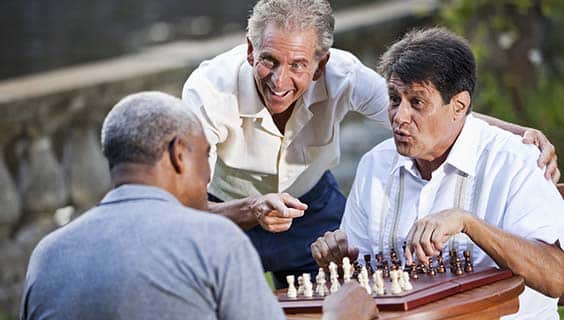
The brain controls many aspects of thinking — remembering, planning and organizing, making decisions, and much more. These cognitive abilities affect how well we do everyday tasks and whether we can live independently.
Some changes in thinking are common as people get older. For example, older adults may:
- Be slower to find words and recall names
- Find they have more problems with multitasking
- Experience mild decreases in the ability to pay attention
Aging may also bring positive cognitive changes. For example, many studies have shown that older adults have more extensive vocabularies and greater knowledge of the depth of meaning of words than younger adults. Older adults may also have learned from a lifetime of accumulated knowledge and experiences. Whether and how older adults apply this accumulated knowledge, and how the brain changes as a result, is an area of active exploration by researchers.
Despite the changes in cognition that may come with age, older adults can still do many of the things they have enjoyed their whole lives. Research shows that older adults can still:
- Learn new skills
- Form new memories
- Improve vocabulary and language skills
Changes in the Aging Brain
As a person gets older, changes occur in all parts of the body, including the brain.
- Certain parts of the brain shrink, especially those important to learning and other complex mental activities.
- In certain brain regions, communication between neurons (nerve cells) may not be as effective.
- Blood flow in the brain may decrease.
- Inflammation, which occurs when the body responds to an injury or disease, may increase.
These changes in the brain can affect mental function, even in healthy older people. For example, some older adults may find that they don’t do as well as younger individuals on complex memory or learning tests. However, if given enough time to learn a new task, they usually perform just as well. Needing that extra time is normal as we age. There is growing evidence that the brain maintains the ability to change and adapt so that people can manage new challenges and tasks as they age.
Talk with your doctor if you’re concerned about changes in your thinking and memory. He or she can help you determine whether the changes in your thinking and memory are normal, or whether it could be something else.
There are things you can do to help maintain your physical health and that may benefit your cognitive health, too. Learn more about cognitive health and take steps to help you stay healthy as you age.
For More Information About the Aging Brain
NIA Information Resource Center
800-222-2225 (toll-free)
niaic@nia.nih.gov
www.nia.nih.gov
McKnight Brain Research Foundation
407-237-4485
https://mcknightbrain.org/
Dana Foundation
212-223-4040
danainfo@dana.org
https://dana.org
This content is provided by the NIH National Institute on Aging (NIA). NIA scientists and other experts review this content to ensure it is accurate and up to date.
“How the Aging Brain Affects Thinking.” National Institute on Aging, http://www.nia.nih.gov/health/how-aging-brain-affects-thinking. Accessed 12 Nov. 2020.
